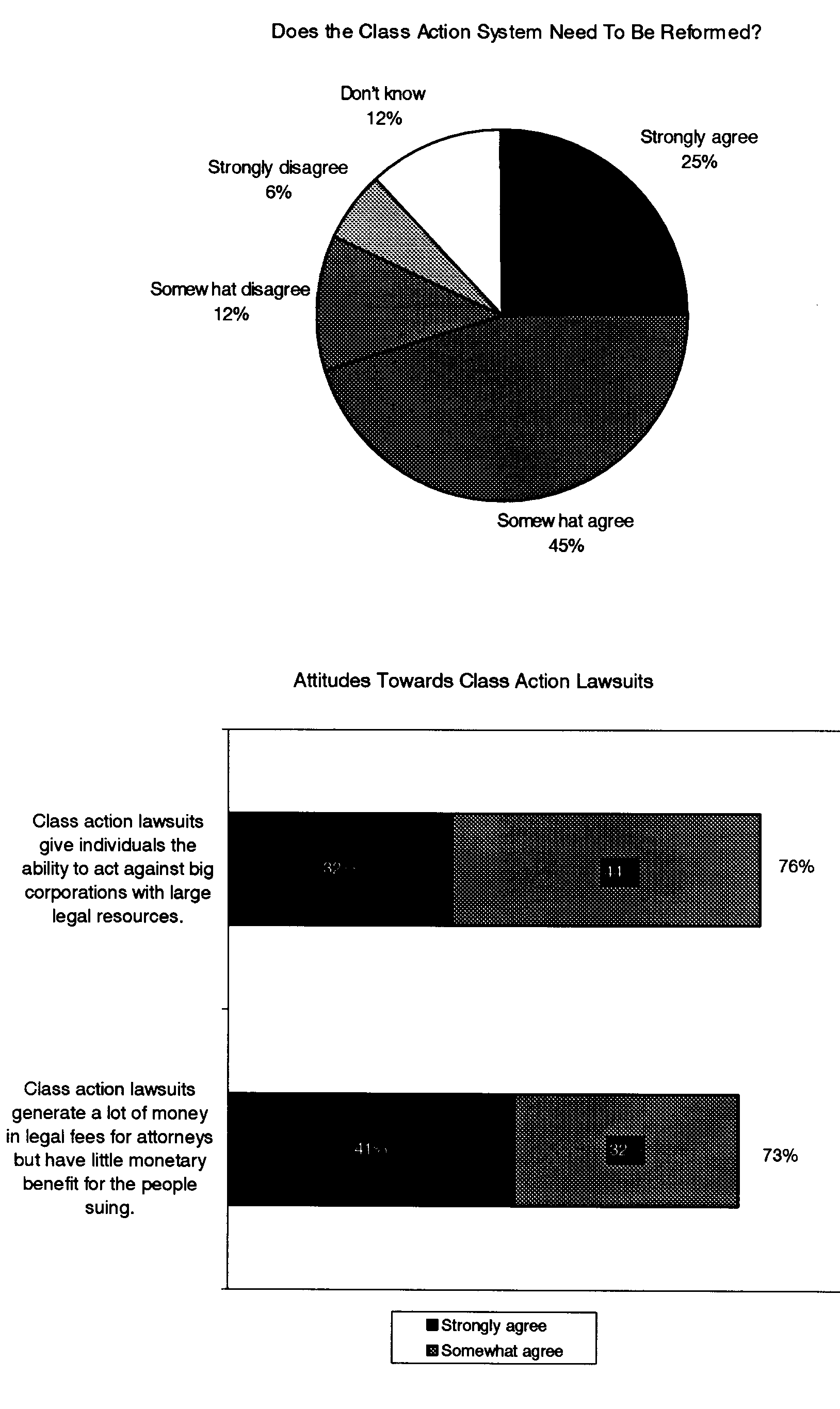

June 6, 2000 Karen Burger, CPCU, CPIW Phone: (610) 644-2100, ext. 7805 Fax: (610) 644-7629 E-mail: burgerk@cpcuiia.org
Most Americans Surveyed Favor Reform of the Class Action System MALVERN, Pa. Ė The majority of respondents to a recent Insurance Research Council (IRC) survey of U.S. households support changes in the way that class action lawsuits are handled. Seventy percent of survey respondents agreed that significant reform of the class action lawsuit system is needed. Class action lawsuits are legal actions filed by a few individuals on behalf of a large number of people who together attempt to obtain a legal remedy for some alleged wrong. Two common examples of class actions are consumer class actions (in which the plaintiffs contend that a business has engaged in fraudulent business practices) and mass tort class actions (in which the plaintiffs allege that the defendant has caused them personal injury or property damage). Forty-four percent of respondents in IRCís recent survey said that the number of class action lawsuits today is too high. Only six percent said that the number is too low. Similarly, 41 percent of respondents said that the average size of awards in class action lawsuits is too large, while only 10 percent said that awards are too low. The survey revealed an interesting dichotomy in the publicís views of class action lawsuits. Most respondents (76 percent) agreed that class action lawsuits give average people the ability to act against big corporations with large legal resources. Interestingly, however, nearly as many respondents (73 percent) believe that class action lawsuits generate a lot of money in legal fees but produce little monetary benefit for the people suing. "Americans have mixed views about class action lawsuits," according to Elizabeth A. Sprinkel, senior vice president who heads the IRC. "While they show concern about individualsí ability to seek compensation from large organizations, they worry about the number and size of awards of class action lawsuits as well as the share of settlements that attorneys claim." The results contained in IRCís recently released report, Public Attitude Monitor 2000, Issue 1, were based on a survey conducted by Roper Starch Worldwide. The survey consisted of telephone interviews with 1,000 men and women 18 years old and older conducted in February 2000. Survey participants were selected to be representative of the population of the continental U.S. The survey also addressed attitudes towards third party bad faith lawsuits and insurance fraud. For more detailed information on the studyís methodology and findings, contact Elizabeth Sprinkel by phone at (610) 644-2212, ext. 7568; by fax at (610) 640-5388; or by e-mail at irc@cpcuiia.org. Or visit IRCís Web site at www.ircweb.org. Copies of the study are available at $10 each in the U.S. ($20 elsewhere) postpaid from the Insurance Research Council, 718 Providence Rd., Malvern, Pa. 19355-0725. Phone: (610) 644-2212, ext. 7569. Fax: (610) 640-5388. NOTE TO EDITORS: The Insurance Research Council is a division of the American Institute for CPCU and the Insurance Institute of America. The Institutes are independent, nonprofit organizations dedicated to providing educational programs, professional certification, and research for the property and liability insurance business. The IRC provides timely and reliable research to all parties involved in public policy issues affecting insurance companies and their customers. The IRC does not lobby or advocate legislative positions. It is supported by leading property and liability organizations.
|
|
| Home | About IRC | Our Sponsors | News Release | Public Policy |
|
